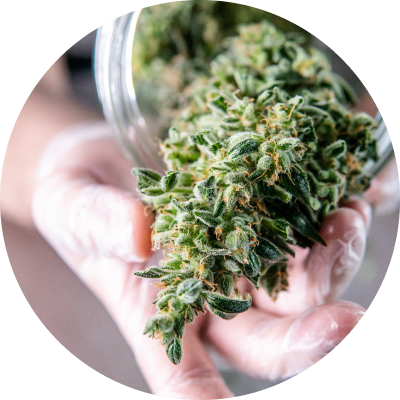For thousands of years, humans have been turning to the cannabinoids found in the cannabis plant to achieve potential relief from all kinds of daily complaints. Now, thanks to decades of medical research, we can finally understand why. Cannabinoids are fascinating compounds that work with the body in a way unlike any other plant derivatives, and because of that, we’re able to derive real, tangible benefits from them each time we take them.
There has been more of an emphasis than ever before on the use of cannabinoids for specific medical conditions. More and more people are claiming that certain compounds found in cannabis have helped them address symptoms which have been bothering them for years. But, what does the actual science say – can cannabinoids address certain medical ailments, or are we giving these plant derivatives too much credit? Let’s find out.
What is a Cannabinoid?
First off, let’s clear up any potential misunderstandings about the actual nature of cannabinoids. Essentially, cannabinoids refer to a category of compounds only found in the cannabis plant, which has given us both hemp and marijuana. Cannabis has some 100+ individual cannabinoids within its chemical composition, with the large majority existing in the female plant’s flowering buds.
Cannabinoids are nontoxic to the human body, and may or may not be psychoactive depending on the individual cannabinoid in question. Something we also want to point out is that the body produces its own cannabinoids, known as endocannabinoids, which are different from the cannabinoids in cannabis. Endocannabinoids like anandamide and 2-arachidonoylglyerol have the job of regulating critical functions of the body like serotonin uptake, inflammatory response, respiratory sensitivity, body temperature, and more.
Understanding the Endocannabinoid System
To understand why cannabinoids are potentially capable of addressing certain medical issues, we need to turn our attention toward the endocannabinoid system. For decades, scientists were puzzled as to why the cannabinoids in cannabis are capable of providing so many potential benefits throughout the body, so effectively. Then, in the 1990s, a team of researchers finally discovered the endocannabinoid system (ECS), which we now know is present in the body of every mammal.
The endocannabinoid system is a vital system consisting of a complex network of cannabinoid receptors located throughout the entire body, in every bodily system, with the end goal of keeping us in homeostasis. Acting as the body’s self-regulating powerhouse, it features two categories of cannabinoid receptors – CB1 receptors (cannabinoid receptors primarily in the brain) and CB2 receptors (cannabinoid receptors located primarily in the peripheral nervous system, immune system, and digestive system). These cannabinoid receptors regulate processes within their territories that relate to physiological function and health but can only do so when they receive cannabinoids.
The cannabinoids in cannabis bind directly to these cannabinoid receptors, and this chemical reaction enables CB1 and CB2 receptors to regulate important processes that play a role in our health, and how we generally feel each day, both physically and mentally. That being said, it’s now clear that the bodies of mammals are equipped to tolerate cannabinoids very well.
Popular Cannabinoids with Potential Benefits
Like we mentioned earlier, there are over 100 individual cannabinoids found in cannabis. However, some cannabinoids have been given prominence over the years for their uniquely valuable reported effects. Let’s take a look at some of the most fascinating and valuable cannabinoids that may offer therapeutic benefits.
- Cannabidiol (CBD): A nonintoxicating cannabinoid that dominates the hemp plant’s chemical composition, and even has a staggering number of potential benefits related to things like pain, mood disorders, sleep, digestion, blood pressure, nausea, appetite, neurological function, and more.
- Cannabinol (CBN): A minor, nonintoxicating cannabinoid in hemp, which has largely become associated with sleep and stress relief, but also shows clear antibacterial benefits that may have further implications when it comes to infections.
- Cannabigerol (CBG): The “mother cannabinoid”, being the primary compound in the immature cannabis plant, prior to splitting off into the 100+ cannabinoids that are found in the plant once it matures. All cannabinoids are derived from CBG, and CBG itself seems to offer unique properties related to immune function and inflammation.
- Delta-8 Tetrahydrocannabinol (Delta 8 THC): A trace cannabinoid that’s mildly psychoactive, and appears to offer anxiolytic, analgesic, anti-inflammatory, antiemetic, and neuroprotective properties.
- Tetrahydrocannabinolic Acid (THCA): Is the raw form of THC that’s found in raw cannabis prior to the plant being decarboxylated – in other words, heated to a precise temperature which converts raw cannabinoids into “active” cannabinoids. THCA, left raw, may offer unique anti-inflammatory effects.
- Hexahydrocannabinol (HHC): A cannabinoid found in hemp’s pollen and seeds, rather than the female flowering buds. It’s the hydrogenated version of delta 9 THC, essentially mirroring the property profile of delta 9, only with an extra hydrogen atom that enhances its chemical stability.
- Delta-9 Tetrahydrocannabinol (Delta 9 THC): The dominant cannabinoid in marijuana, and extremely well-known for its distinctive high. But, it’s also one of the most researched cannabinoids of all time for its plethora of potential health benefits, and if it weren’t for these potential benefits, the medical marijuana market would not exist.
- Tetrahydrocannabivarin (THCV): A unique THC cannabinoid that has only extremely mild psychoactive effects, and has been getting a lot of attention for its potential relationship to blood sugar and glucose levels, which we’ll get into more shortly.
- Tetrahydrocannabiphorol (THC-P): Newly discovered cannabinoid that’s about 10x as intoxicating as delta 9 THC, and beyond that, it has been found to offer numerous potential benefits, including analgesic, anti-inflammatory, antiemetic, and appetite-boosting properties.
Could Cannabinoids Really Provide Help with Medical Conditions?
Now you have a good idea of what cannabinoids are, how they interact with the body, and which ones are particularly known for their possible therapeutic uses. Let’s look a little bit deeper at some of the known effects of these cannabinoids, according to the findings of researchers, along with the anecdotal information that has been available since these cannabinoids have been released onto the legal market.
The Anti-Inflammatory Properties of Cannabinoids
For decades, researchers have observed clear anti-inflammatory effects associated with cannabinoids, including all of the ones we listed above. Like we said, cannabinoids interact with CB2 receptors, which, among other things, regulate our body’s natural inflammatory response, which sends cytokines to areas of the body that have become infected or injured. Cannabinoids have been observed offering valuable benefits to those with arthritis pain, among other inflammatory conditions, both addressing pain and other symptoms of inflammation that interfere with the function of the body. It’s worth pointing out that these anti-inflammatory effects also show impressive efficacy when applied topically.
Cannabinoids for Mental Health
Cannabinoids have been associated with aiding in relief of symptoms from a number of mental health conditions, including very common mood disorders like anxiety, PTSD, depression, and insomnia. A staggering number of cannabinoids have shown anxiolytic activity, including delta 9 THC, delta 8 THC, CBN, CBD, and THC-P. Cannabinoids interact with CB1 receptors in the brain that regulate neurotransmitters, and these neurochemicals influence our mood and overall mental function. Currently, researchers are exploring the possible use of CBD in addressing schizophrenia symptoms.
Cannabinoids for Cognitive Function and Neurological Regulation
Over the years, more and more clinical research has gone into exploring the relationship between cannabinoids and cognitive/neurological disorders. CBD and other cannabinoids have been associated with improved cognitive function, along with several specific strains of the cannabis plant, which could potentially boost memory, focus, alertness, motivation, and mental stamina. Cannabinoids also show clear neuroprotective properties, in that they may stimulate neurogenesis and protect neural pathways in the brain, which is why several cannabinoids, including CBD and delta 9 THC, show enormous promise in addressing neurological conditions like epilepsy, multiple sclerosis, and more.
Cannabinoids for Cardiovascular Function, Blood Sugar, and Glucose Regulation
Cannabinoids have been shown to work with cannabinoid receptors that regulate cardiovascular functions like heartrate and blood pressure. In particular, CBD has been shown to offer potential benefits to those who are prone to high blood pressure.
THCV, or tetrahydrocannabivarin, meanwhile, is being studied for its potential uses related to diabetes and other blood sugar/glucose irregularities. The cannabinoid shows strong potential at helping the body regulate blood sugar and glucose levels.
Chronic Pain and Cannabinoid Administration
Cannabinoids have long been used for their analgesic effects, hundreds of years before scientists were able to figure out why. The way in which cannabinoids interact with cannabinoid receptors in the nervous system enables these receptors to regulate the way in which the body responds to pain, minimizing pain sensitivity to potentially address the needs of individuals who live with chronic pain.
The Effects of Cannabinoids on Our Pets
We do want to mention that because all mammals have endocannabinoid systems, are pets may benefit from certain cannabinoids as well. CBD is the only cannabinoid that has shown positive results when administered to cats and dogs, and psychoactive cannabinoids can be incredibly dangerous to their health, so keep that in mind – along with the fact that if you are going to give a pet CBD, you must give them a product made especially for pets. But, overall, CBD’s effects on mood, inflammation, pain, neurological function, and so on can be applied to pets, and the cannabinoid has been found to offer relief from a number of symptoms that commonly affect felines and canines.
What You Need to Know About Using Cannabinoids for Medical Conditions
Now, we do want to mention that if you are going to look into using some of these cannabinoids to address any medical issues you may be having, there are certain things you need to know that can majorly affect the outcome of your experience.
Tip #1: Tell Your Doctor
First off, please let your doctor know that you intend on using cannabis as a secondary form of treatment for your medical issue. Keep in mind that cannabinoids suppress the CYP3A4 enzyme that’s needed to break down a number of commonly prescribed medications. If you’re on medications, consult with your doctor whether or not taking cannabinoids is advisable.
Tip #2: Choose Your Product Carefully
As you can imagine, some cannabinoid products are better, safer, and more effective than others. Select a brand that has a strong reputation, and even employs third-party lab-testing for all products. Consider the milligram strength and delivery method according to your needs, keeping in mind that more severe conditions typically respond better to higher servings of cannabinoids.
Of course, you also want to go with cannabinoids that have well-researched properties pertaining to your particular issue, and, if applicable, strains of cannabis products that are known for offering benefits that correlate to your needs.
Tip #3: Plan Out an Effective Routine
How you take cannabinoids matters, and people often overlook the methods involved in maintaining a successful routine. Most importantly, perhaps, you should consider taking them daily. The more consistently you take cannabinoids, the better, as the endocannabinoid system utilizes them best when they are allowed to accumulate in the body. Also, of course, you’ll want to time your daily servings according to when you need them the most – like, for instance, taking delta 8 THC at bedtime to help with sleep, or something along those lines.
Tip #4: Be Open to Experimentation
You’ll want to remain open-minded when it comes to cannabinoids. In other words, be open to trying new product types, milligram strengths, formulations, strains, and the cannabinoids themselves. You never know which products exist out there that really capture what your needs are, and many people find that taking different products in combination with one another really takes their routine to the next level.
The cannabis market is always evolving, and new research is always being done, which means that we’re learning more about cannabinoids daily. Because of this, the market is getting better and better at producing cannabinoid-infused formulas that can provide significant help to our daily lives.
Cannabinoids Seem to Be Jammed-Packed with Potential Benefits!
At the end of the day, it’s basically impossible to deny that cannabinoids found in cannabis can offer significantly positive effects on our daily lives. And, by now, we’ve all seen numerous studies showing the real potential that these fascinating compounds have when it comes to addressing specific medical conditions of all kinds.
Basically if you’re looking for a holistic, nontoxic, and all-natural way to manage your wellbeing, cannabinoids can really be the best option for you. In fact, Greenlife Remedies supplies a wide selection of products highlighting different cannabinoids, including all of the ones that we’ve mentioned above, so that our customers can really address their needs with top-quality products.
GreenLife Remedies formulas have all undergone strict third-party lab-testing, and are formulated with the best ingredients we can find. Most importantly, they provide effective servings of carefully extracted, organic cannabinoids derived legally from the hemp plant.
So, if you’re ready to incorporate these incredible compounds into your daily routine, we invite you to either visit our dispensary in Charlotte, North Carolina, or explore the products we carry through our website. Our team of dedicated staff are here to help you find the right formulations for your needs, and will ensure that you get the right recommendations according to the specific type of relief you’re seeking out.





